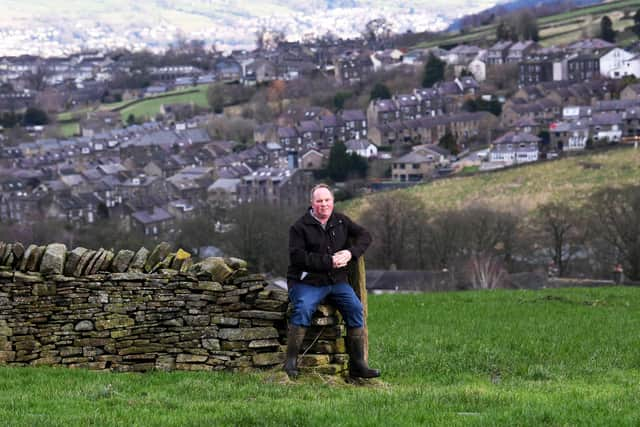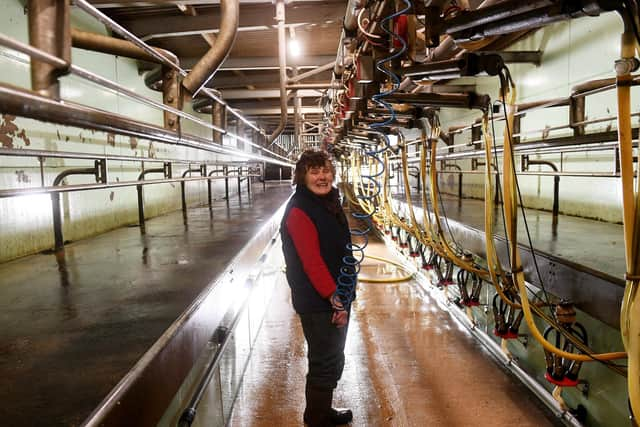Farm of the Week: How a 'small Yorkshire farm on a hill' is supplying Costa Coffee thanks to contract with Arla
Robert wasn’t born when those momentous occasions occured but he is the dairy farmer at Old Oxenhope today running a herd of 300 Holstein cows and having invested significantly in his future in recent times with new buildings and facilities, including a new milking parlour, which he says has come about because of the confidence he has in farmer owned dairy cooperative Arla, which is where the Costa Coffee connection comes in.
“I wouldn’t have had the confidence to take on the investment we have put into our farm without my Arla contract,” says Robert.
Advertisement
Hide AdAdvertisement
Hide Ad“When I had the opportunity of becoming a full member of Arla I joined at the earliest opportunity. Arla’s not going to go bust next week, they’re not going to decide to close down the Leeds dairy and say they don’t need the milk because Arla is owned by farmers and no-one is taking a profit out from the business apart from the farmer members.


“It has a really good team of people working their socks off to make the maximum amount they can and every bit of that comes to us.
Robert was elected to represent his fellow Arla dairy farmers in the Skipton area seven years ago, which led to him being elected on to the Arla board of representatives three years ago that now sees him combining the milking of his dairy herd with meetings from Matlock to Denmark. He is passionate about the future for milk.
“Ours is a small farm on the top of a hill, but through being with Arla it can actually be profitable. I’ve formed some great working groups with dairy farmers from Denmark, Germany and Sweden and we work well together.
Advertisement
Hide AdAdvertisement
Hide Ad“It is about working together and understanding such aspects of farming as all this sustainability stuff. There are probably some dairy farmers that don’t go to any of the meetings and therefore aren’t impressed because they are maybe not listening, but once you hear and get the inside story on all this sustainability work Arla is doing and you find out it is winning contracts, like we just have with Costa Coffee, you realise it makes business sense.


“We’ve won the Costa Coffee contract for supplying them with our milk because Costa Coffee saw the whole package that Arla is offering. That’s what made them switch their contract to us. That’s just one of the ways Arla is winning contracts, by appealing to those companies that have commitments they have to make to the buyers of their products.
“What I tell farmers in my area, that now covers the North of England and North Wales is that not only is it working with climate change initiatives and sustainability schemes and a good media story, it is also making us more profitable.
Robert says his family’s long-term alignment to Asda and Arla has been instrumental in achieving better performance from his dairy herd.
Advertisement
Hide AdAdvertisement
Hide Ad“Asda’s Chris Brown started with dairy farmer meetings about best practice, which was originally started as Dairylink and then changed to Pathfinders, a benchmarking group, which we have now been involved with for 10 years.
“We share figures and discuss what we have done. My group has people in it from Stranraer, Staffordshire and Cumbria. We meet up three times a year to discuss each others’ business and financial performance and that has been a big driver for our business, that has worked very well. I see benchmarking as crucial. It means we are not isolated. We are not just making things up as we go along but learning from each other.
In recent times Robert has seen other significant changes to the way he farms. Four years ago, he and his brother James split the partnership they’d had for many years which had seen them buy a second farm near Otley in 2007 and had seen their combined operation grow to 300 dairy cows on each farm. It was a planned split.
Robert’s dairy herd currently produces a herd average of 8500 litres per cow and he says that he is moving towards more efficient and productive cows through greater control over genetics, which in so doing will also tie back into the climate agenda that again comes back to providing what today’s customer wants, especially the bigger buyers like Costa Coffee.
Advertisement
Hide AdAdvertisement
Hide Ad“It is all about being more aware of what we are doing and how that ties back in with today’s agenda. We used to rear some replacements and buy others in Gisburn Auction, but we are now moving a lot more to rearing our own because we can get more control over genetics and more efficient cows. The more efficient you are on farms, with better feed conversion rates and more litres per cow, that’s better for the climate and more profitable as well.
“We have started a biggish push to get the genetics moving up. All of our better cows and heifers are AI’d with sexed semen to produce more productive dairy cows, but it’s also about the beef calves too.
“We use British Blue or Aberdeen Angus semen on the rest of the dairy herd and the company we have been selling them to at three weeks old, for the last three years, Vitulo based in Suffolk, want us to use bulls that have proof they grow quicker and are therefore more climate efficient. Their selling point is their beef is low carbon footprint.
“Because we farm at 900ft above sea level we have to buy some feed in. We buy Trafford Gold and pressed pulp which can be useful because as you are using a by-product some of that carbon footprint has gone with the original product so it works quite well with our climate score. We also get a lot of points if we don’t use soya, so we’ve stopped using it and moved on to protected rape. We have not seen any drop in performance.
Advertisement
Hide AdAdvertisement
Hide AdRobert says the diet for his cows is the Trafford Gold and a blend in a TMR mix through a diet feeder, he milks twice daily and his milk is collected every other day and goes to the Stourton dairy.
“We are still a smallish dairy farm on a hill, but we are doing well on things that matter. We’re all on sustainability incentives, doing things where we get points based on what we’re doing towards climate change, and we are getting paid a premium on measurement of our herd health and performance. Arla is selling our milk into new markets, including producing high protein biscuits, made with milk protein and sold in Africa, helping with nutrition.
“I’m very confident of our future here at the farm where my wife Helen has joined me in driving our business forward and our three children may wish to take on a successful enterprise that is very much part of today’s environment.
Comment Guidelines
National World encourages reader discussion on our stories. User feedback, insights and back-and-forth exchanges add a rich layer of context to reporting. Please review our Community Guidelines before commenting.